Can You Not Be Registered And Still Vote
Why Are Millions of Citizens Not Registered to Vote?
A survey of the civically unengaged finds they lack interest, just outreach opportunities exist
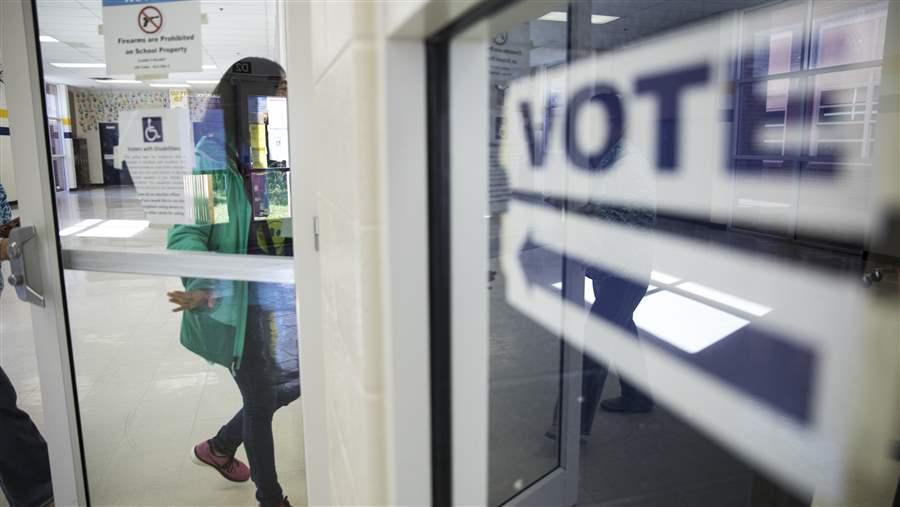
© Samuel Corum/Anadolu Agency/Getty Images
Overview
In every state and the District of Columbia—except N Dakota—individuals who plan to vote in a federal ballot must start register to vote. Yet, a sizable share of eligible citizens do not annals. Official statistics vary, just a bourgeois judge, calculated using information from the U.S. Demography Bureau'due south nigh contempo Voting and Registration Supplement, indicates that 21.iv percent were not registered to vote in 2014.1
Registration'southward importance to the voting process and the large number of individuals who remain unregistered have spurred several major reforms intended to increment voter registration. Most notably, the federal government's National Voter Registration Deed of 1993 (NVRA) requires that states let eligible citizens to annals to vote when completing other transactions at land motor vehicle and social services agencies, a provision ordinarily known as Motor Voter.2 Since enactment of the constabulary, some states have expanded on this requirement past automating the Motor Voter process. Colorado upgraded its Motor Voter process in 2017, and Oregon became the first state to implement automated voter registration in 2016, with at to the lowest degree six more planning to implement similar policies in the future.three Other states offer Same Day Registration, which allows individuals to register and vote on Election Day, often right at their polling places.iv
Despite these efforts, picayune is known about eligible but unregistered U.S. citizens' exposure to opportunities to annals, reasons for choosing not to, or attitudes toward the electoral system and borough engagement, or how many of them are interested in registering in the future. To begin to make full this gap, The Pew Charitable Trusts deputed a nationally representative survey conducted in March and April 2016 that included a large population of unregistered individuals. This chartbook presents findings from the survey about the attitudes and experiences of those who said they were not registered to vote in the months preceding the 2016 presidential election, including:
- Less than 20 percentage of eligible citizens take been offered the chance to register at a motor vehicle or other government agency.
- The unregistered were more than likely to say they exercise not vote because they dislike politics or believe voting will not make a divergence, while people who are registered but vote infrequently say they practice not vote more than often because they are not informed plenty about the candidates or issues.
- At least 13 percent of the unregistered, generally those who are younger and more civically engaged, say they could exist motivated to register in the future.
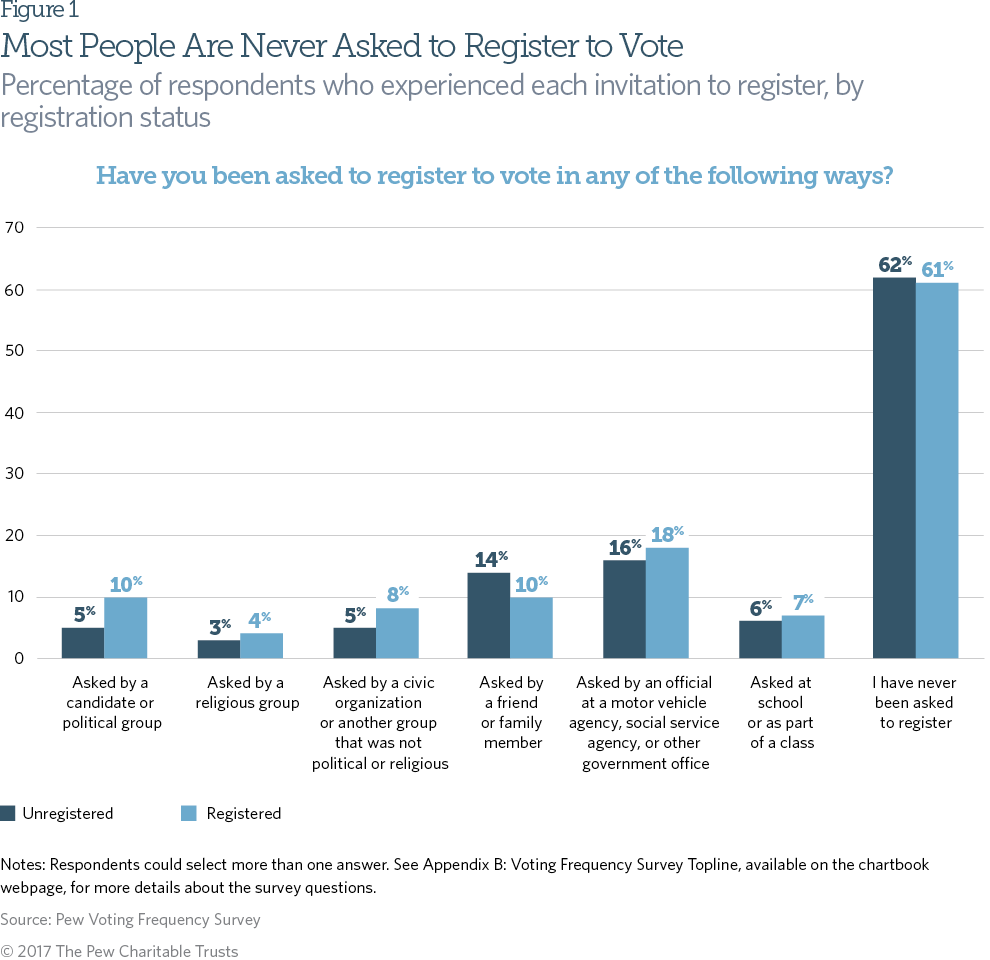
Because the American voting system requires individuals to annals before they can vote, many political campaigns, nonprofits, religious organizations, and other groups concord voter registration drives. Despite these well-publicized efforts, more than than 60 percent of adult citizens have never been asked to register to vote, and the charge per unit was nearly identical among individuals who are and are not registered.5 Among respondents who had been invited to register, the most probable context was by an official at a motor vehicle agency, social service agency, or other regime part. Withal, less than 20 pct of all those surveyed reported such an occurrence, which indicates that the NVRA has not been successful at reaching a large percent of the population.
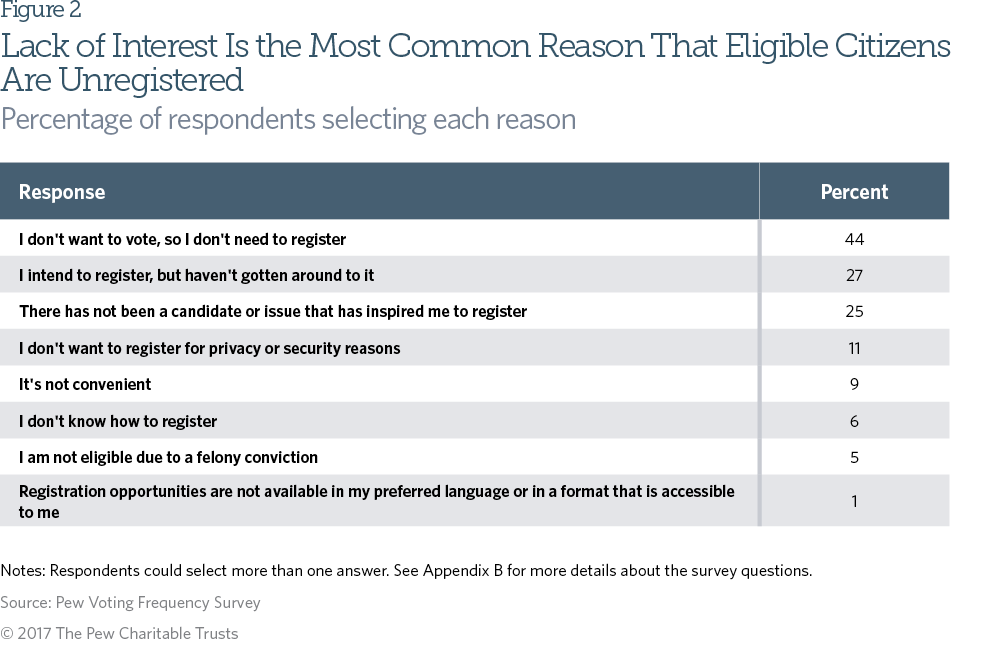
Xl-four percent of eligible unregistered individuals say they practice non desire to vote. Another 27 percent say they intend to annals but haven't done and then yet, and 25 pct say they are unregistered considering they accept not been inspired by a candidate or issue. Eleven percent practise not want to register due to privacy or security reasons. The survey was conducted before revelations in fall 2016 that hackers had targeted data from state voter registration systems, and so the results do non reverberate the public concern about the security of voter information that developed late in the campaign.half-dozen
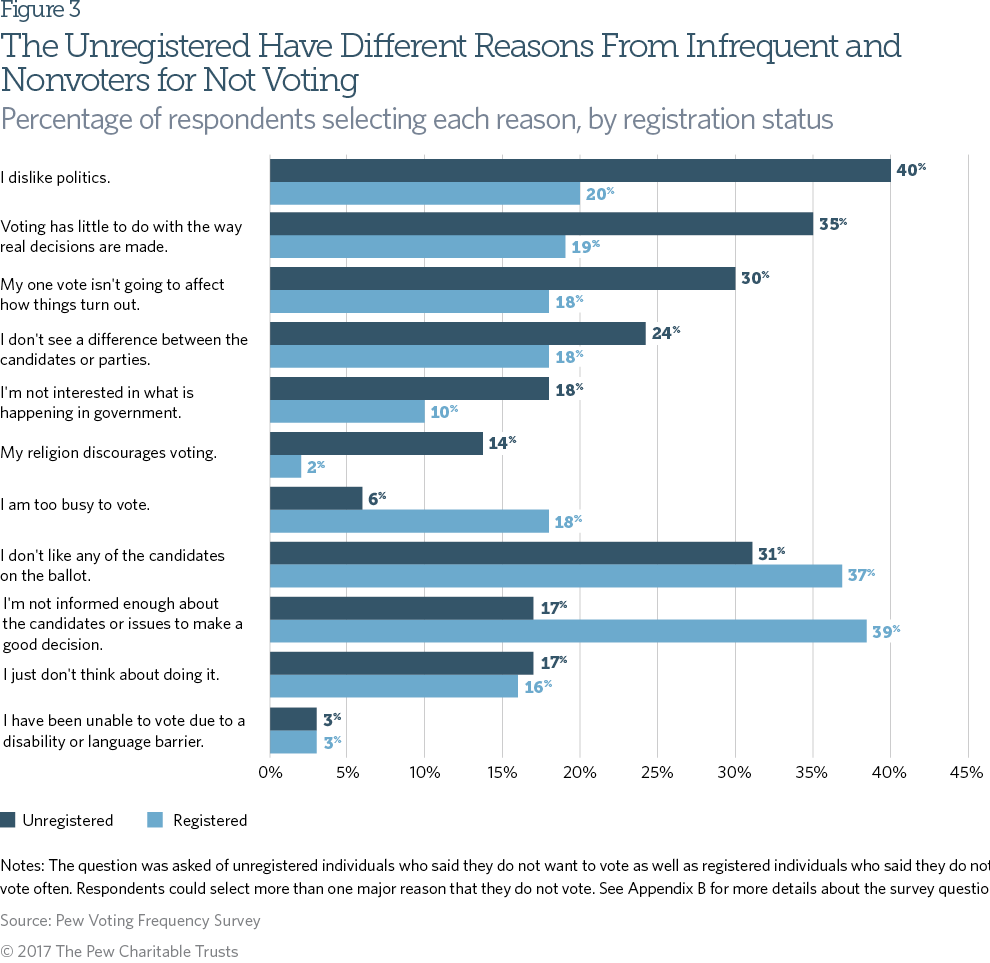
The unregistered are more likely to point a broad distaste for the electoral arrangement than registered individuals, who tend to give election-specific motives for nonvoting, such as disliking the candidates or not knowing enough most the issues. 40 percent of the unregistered say their disfavor to politics is a major reason they don't want to vote, and 35 percent say voting has little to practice with the way real decisions are made, compared with 20 and 19 percent of registered but infrequent voters, respectively.
Previous enquiry has found that many unregistered students feel they should not vote because they are insecure most their political knowledge.7 Withal, this survey found that only 17 percent of the unregistered population chose non to vote considering they are too uninformed virtually the candidates or issues to make proficient decisions, compared with more than twice that amount—39 pct—of registered exceptional voters.
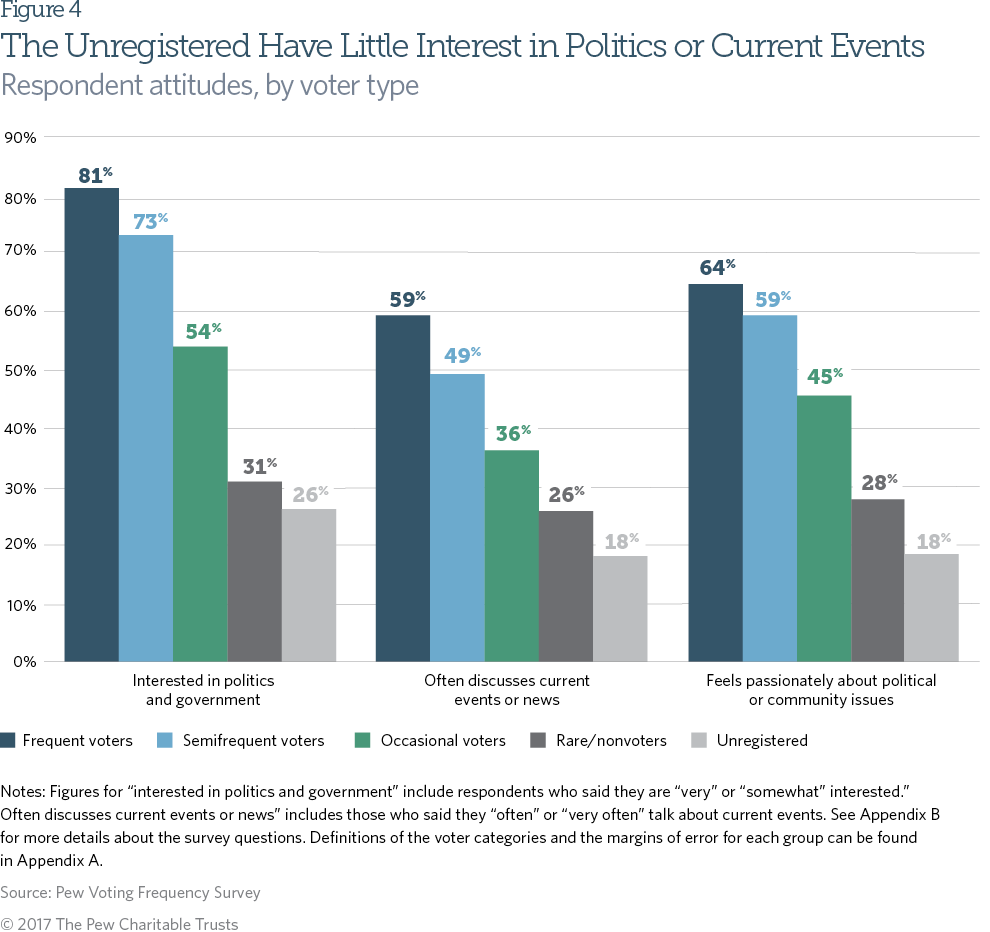
Some people vote in many types of races, while others turn out only for certain elections or are registered but never vote. For instance, in 2016, approximately 60 percent of eligible citizens voted in the presidential election, but in the 2014 congressional races, turnout was less than twoscore per centum.8 To better understand how the unregistered population compares with these unlike groups of voters, the survey asked respondents to think about the various types of elections and evaluate how often they have voted since they were beginning eligible.9 Based on measures of people's interest in government, current events, and political issues, unregistered individuals differ very lilliputian from those who are registered only rarely or never cast a ballot, while frequent voters are more than three times every bit likely as the unregistered to express interest in government.
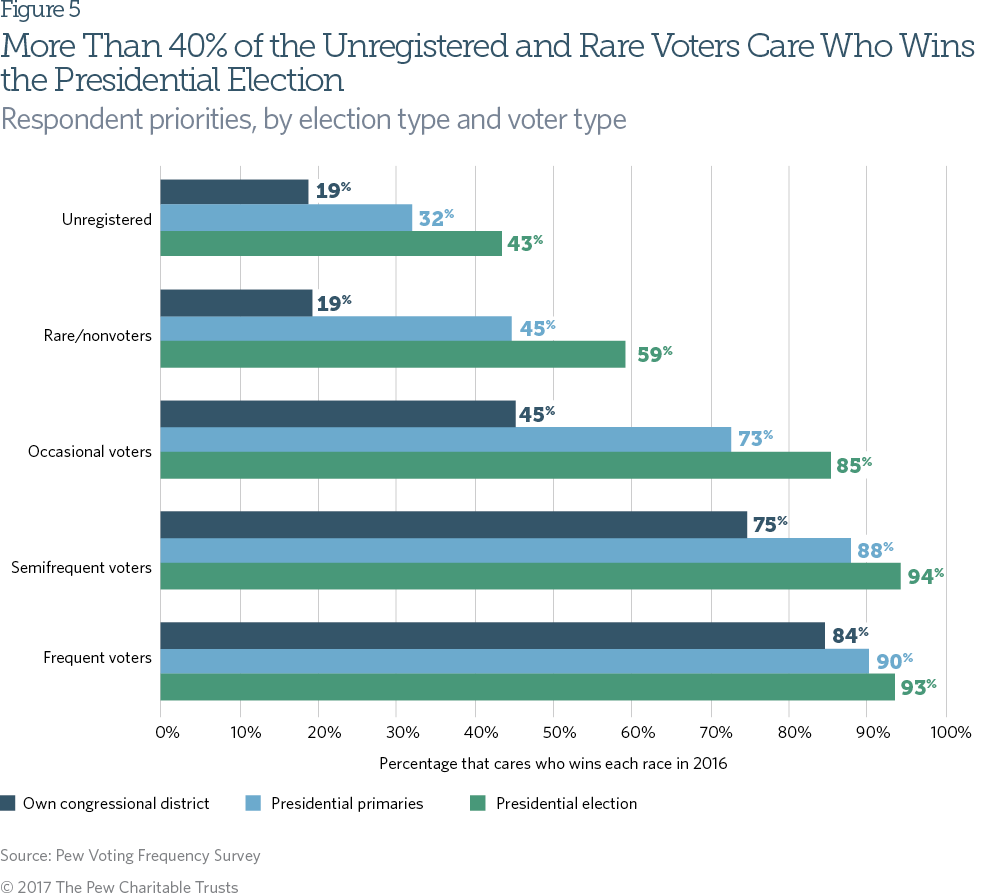
Despite not participating in elections, 43 percent of the unregistered and 59 per centum of rare or nonvoters say they care a expert deal who wins the presidential election. These groups expressed far less involvement in the effect of congressional races and presidential primaries, while frequent voters care about the winner of all three types of elections at very loftier rates. Although some of the unregistered may care who governs, many of these respondents all the same were not interested in participating in choosing the president: But 38 per centum said they intended to register but had not washed so at the time of the survey, and 32 pct said they did not want to vote, probably because of their full general belief that voting is asunder from the way real decisions are made and their feeling that one vote would non bear upon the upshot of the election. (See Figure 3.)
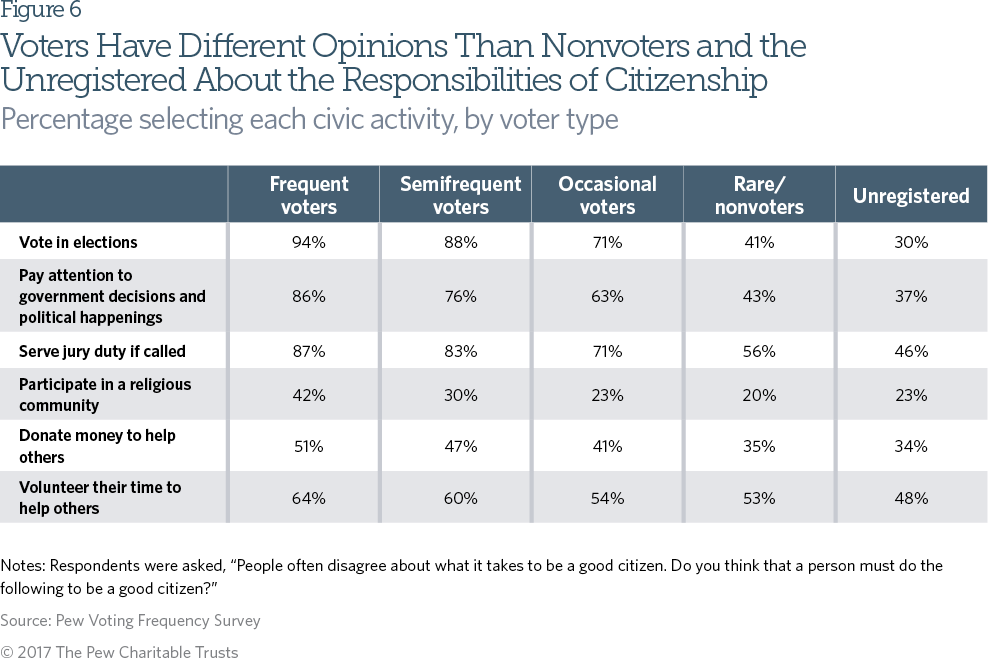
Voters diverge significantly from the unregistered in terms of their views about the behaviors that are necessary for a person to be considered a practiced citizen. Jury service was the most unremarkably selected behavior for good citizens across groups at 69 percent of all respondents. However, across groups, the priority on jury duty differed widely: Just 46 percent of the unregistered identified this every bit an essential responsibility of good citizenship, compared with 87 per centum of frequent voters. Voters and the unregistered tended to exist more like-minded about behaviors such as volunteering time to help others. Sixty-iv percent of frequent voters and 48 pct of the unregistered said volunteering is something that a person should exercise to exist a good denizen. Voting in elections and paying attention to politics were the ii behaviors well-nigh which voters and the unregistered population differed most. Frequent voters were more than three times as likely as the unregistered to say voting is something that skilful citizens should do.
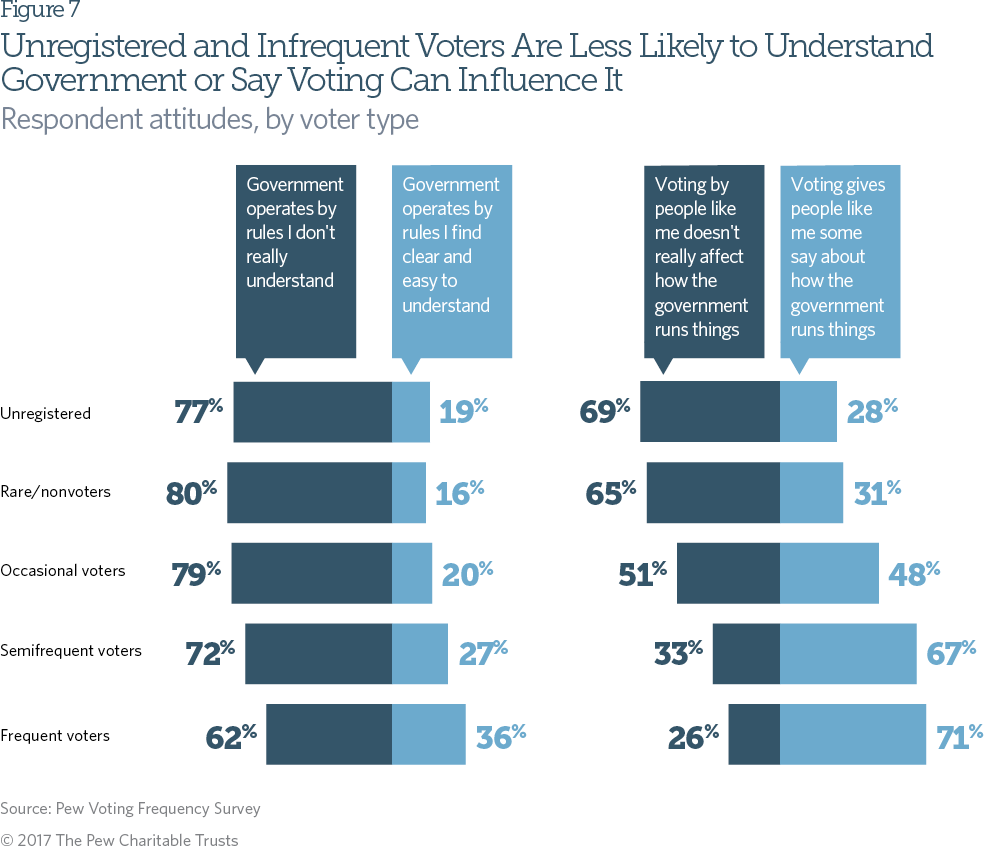
An individual'due south belief that he or she is qualified to empathise and participate in politics is considered a key metric for inferring date in the political system.10 All groups, except the most frequent voters, reported that the rules of regime are hard to empathise at roughly similar— and high—rates. But when asked if voting could influence the way the government is run, the unregistered and rare or nonvoters both tended to say it does not, which very clearly diverged from more than frequent voters, who largely said voting does affect governance.
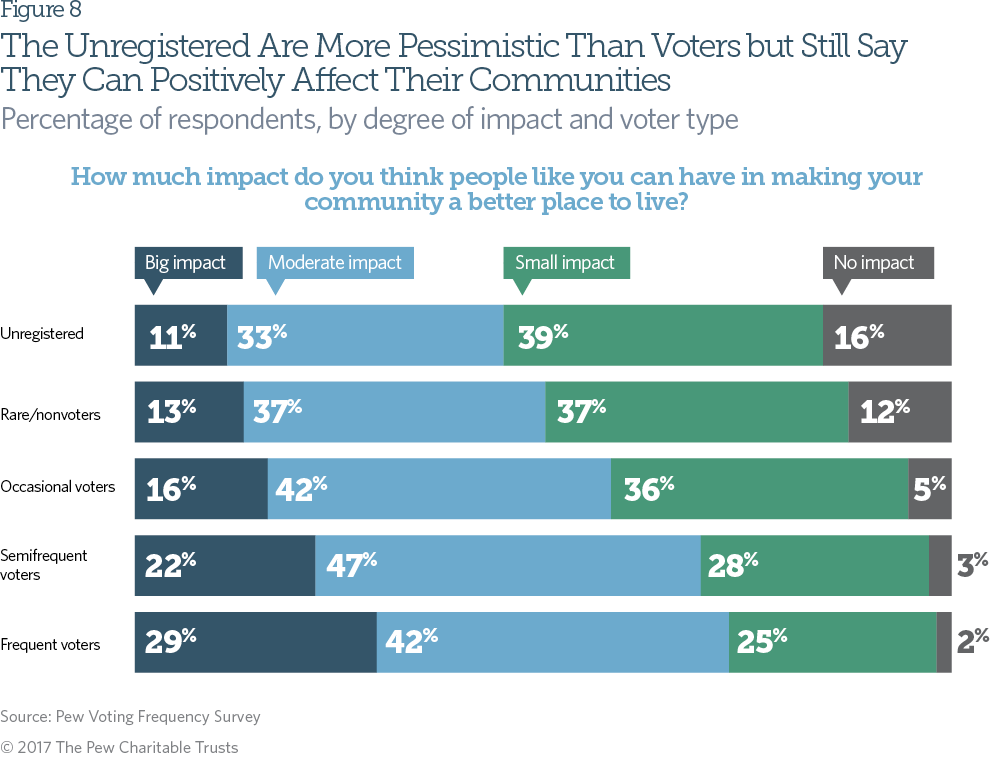
Well-nigh people, including more than 80 percent of the unregistered population, said they could accept at least a small positive impact on their communities. Occasional, semifrequent, and frequent voters were all most probable to say they could take a moderate effect, while rare and nonvoters were equally probable to choose moderate or small. The largest share of unregistered respondents said they could have but a small touch on.
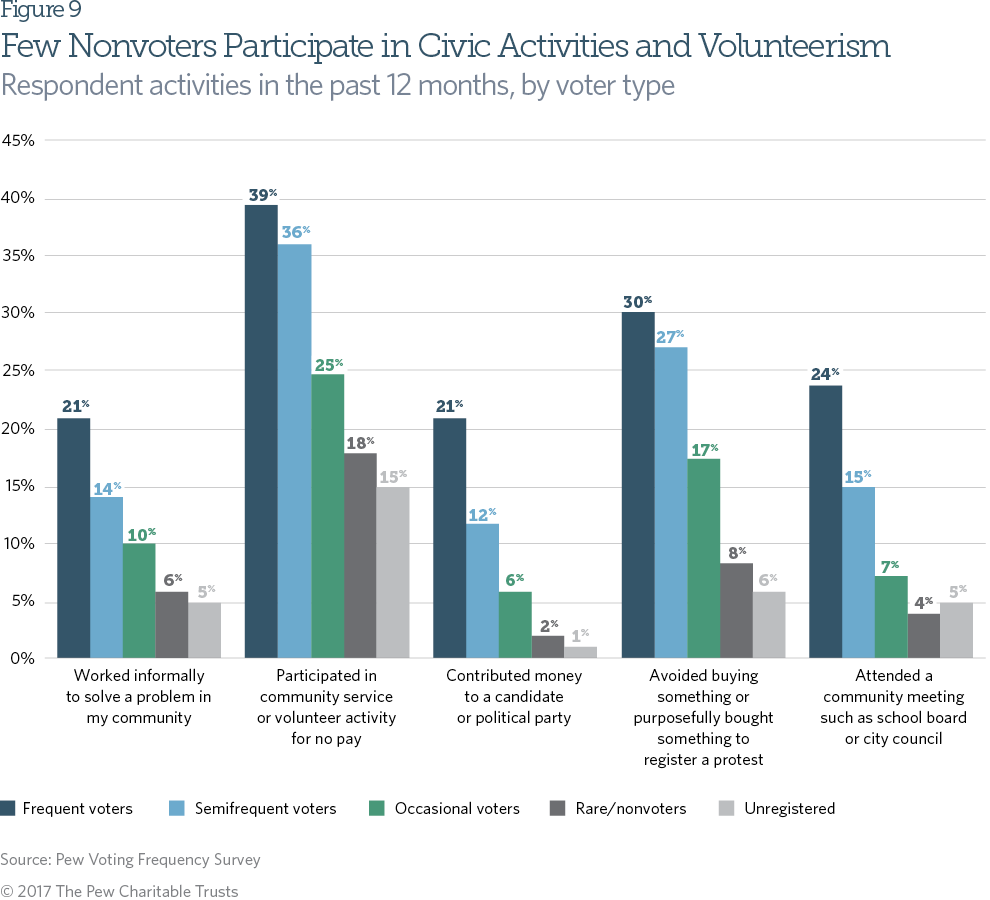
Given that nonvoters and the unregistered accept limited confidence in their power to affect their communities, the fact that they are less likely to engage in civic and volunteer activities than groups who vote more ofttimes is not surprising. Across unlike types of activities, the unregistered and nonvoters participate more often in those that are not political in nature. Only 1 percent of the unregistered have donated money to a political candidate or organization, and just v percentage have attended a customs meeting. However, xv percent have done unpaid volunteer work. The civic behaviors of the unregistered population did not differ significantly from those of respondents who rarely or never vote and, in some cases, occasional voters were nearly as disengaged.
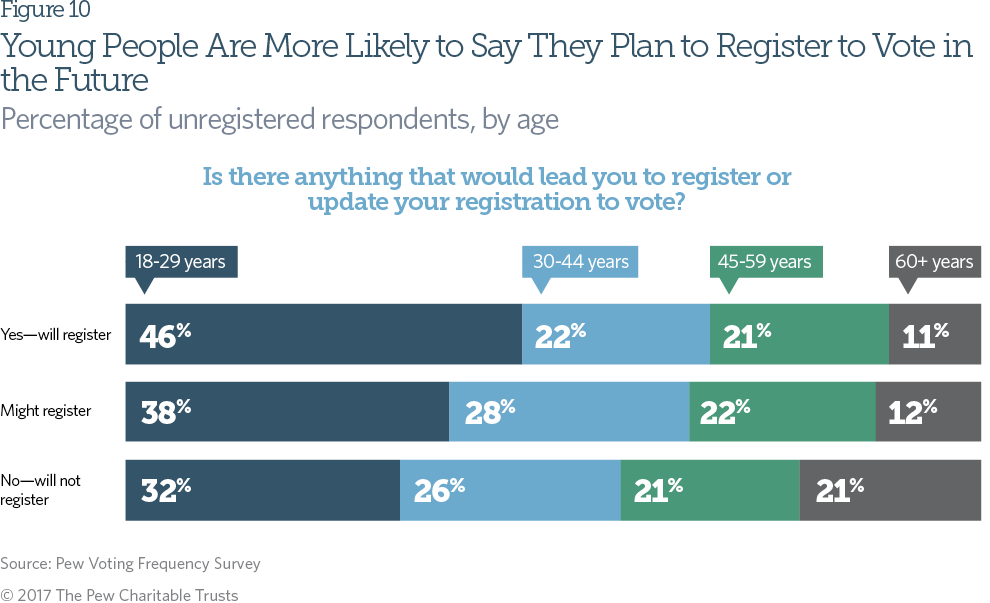
Amidst the unregistered population, responses differed nigh maybe registering to vote in the futurity. Overall, 43 percent of the unregistered said nothing would motivate them to register, xiii per centum said something might, and 44 per centum were undecided. Those who were open up to registration tended to be younger: 40-half dozen percent of those who said they would register were between 18 and 29 years old, compared with 21 pct ages 45 to 59 and only 11 percent lx or older.
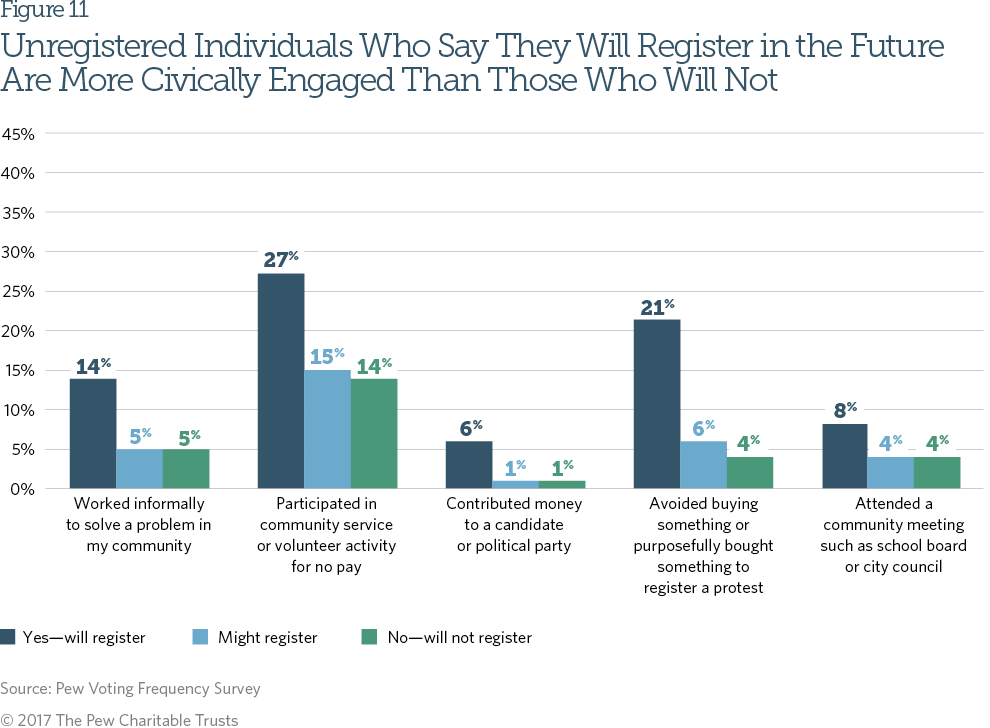
Among the unregistered, those who said they would register reported patterns of borough engagement that closely resembled those observed for occasional or semifrequent voters. Fourteen pct of unregistered individuals who said they would annals and semifrequent voters had worked informally to solve a trouble in their community, and 21 and 27 percent of those groups, respectively, had engaged in economic protest. Similarly, 27 percent of those who would register had done unpaid volunteer work, 6 percent had contributed money to a candidate, and 8 percent had attended a community coming together, all which closely track the rates amid occasional voters (25 percent, 6 percent, and 7 percent, respectively. See Figure 9.)
Decision
The unregistered differ in many ways from those who vote frequently: They are less interested in politics, less engaged in borough activities, and more than cynical near their ability to empathise and influence government, merely they are not appreciably unlike on these measures from individuals who are registered merely rarely vote. However, the unregistered population is not entirely unengaged from civic life; some indicated that they would register, and that grouping too reported participating in community or political activities at rates similar to occasional and semifrequent voters. Further, more than 40 pct of the unregistered cared who would win the presidency in 2016, and some indicated that they could exist motivated to annals in the futurity, though many also feel that the voting process does non affect the way governing decisions are made. These findings suggest that opportunities exist to engage segments of the unregistered population, including through consequent outreach at motor vehicle agencies as required under the NVRA and public education campaigns designed to highlight the significance of individual voter participation to ballot outcomes and the connection between local policies and problems these citizens care about, such as those for which they volunteer in their communities. Less than 20 pct of this group has been asked to register by a country agency, and a substantial increase in that figure could assistance to improve registration rates and balloter participation among these disconnected citizens.
Methodology
The Voting Frequency Survey was conducted online in English and Spanish from March 25 to April nineteen, 2016, by the GfK Group on behalf of The Pew Charitable Trusts. The total sample size was 3,763 U.Southward. citizens 18 years or older. GfK sampled households from its KnowledgePanel, a probability-based, nationally representative spider web panel. The margin of error, calculated with the blueprint effect, at the 95 per centum level of confidence for the total sample is plus or minus 1.ix percentage points. A full methodology, including margins of error for key subgroups, is given in Appendix A: Voting Frequency Survey Methodology, available on the chartbook webpage. The survey questions and frequencies are available in Appendix B: Voting Frequency Survey Topline.
Endnotes
- The Census Bureau calculated that 35.4 percent of eligible citizens were not registered to vote in 2014, equally reported in "Who Votes? Congressional Elections and the American Electorate: 1978-2014," July 16, 2015, https://www.census.gov/library/publications/2015/demo/p20-577.html. However, researchers agree that this calculation artificially inflates the percent of the population that is unregistered because it includes those who were not asked or did not answer the registration question in the Voting and Registration Supplement as being unregistered. More data on the method for adjusting the registration rate can be constitute in The Pew Charitable Trusts, Elections Performance Alphabetize: Methodology (August 2016), http://www.pewtrusts.org/~/media/avails/2016/08/epi_methodology.pdf.
- The National Voter Registration Deed applies to 44 states and the Commune of Columbia. Idaho, Minnesota, New Hampshire, Due north Dakota, Wisconsin, and Wyoming are exempt considering at the fourth dimension the constabulary was implemented, they offered Election 24-hour interval registration or had no registration requirements.
- National Conference of State Legislatures, "Automated Voter Registration," March eight, 2017, http://www.ncsl.org/research/elections-and-campaigns/automatic-voter-registration.aspx.
- National Briefing of State Legislatures, "Same Day Voter Registration," Jan. 11, 2017, http://www.ncsl.org/enquiry/elections-and-campaigns/same-day-registration.aspx.
- Differences are within the margins of fault, which are 3.62 percentage points for the subgroup of unregistered respondents and 2.21 percentage points for registered voters.
- Eric Geller and Darren Samuelsohn, "More than 20 States Take Faced Major Election Hacking Attempts, DHS Says," Politico, Oct. iii, 2016, http://world wide web.pol.com/story/2016/09/states-major-ballot-hacking-228978.
- D.J. Neri, Jess Leifer, and Anthony Barrows, "Graduating Students into Voters" (April 2016), http://www.aascu.org/programs/ADP/StudentsintoVoters.pdf.
- Michael P. McDonald, U.s.a. Elections Project,"Voter Turnout," accessed Feb. six, 2017, http://www.electproject.org/abode/voter-turnout/voter-turnout-information.
- The question asked: "There are many types of elections such equally federal elections for president and members of Congress, primary elections where voters cull party nominees, local elections for urban center quango and school board, and special elections when vacancies arise in between scheduled elections. Which best describes how often y'all vote, since you lot became eligible? Every ballot without exception, Almost every election – may accept missed one or two, Some elections, Rarely, Don't vote in elections." The four frequencies of voting reflect respondents' answers to the question of how often they vote. Individuals who answered "Every election without exception" are defined equally frequent voters, "Almost every ballot – may accept missed one or 2" are semifrequent voters, "Some elections" are categorized every bit occasional voters, and the answers "Rarely" and "Don't vote in elections" were combined into a group chosen rare or nonvoters, both due to sample size and because these ii groups were nearly identical on primal measures.
- Richard Chiliad. Niemi, Stephen C. Craig, and Franco Mattei, "Measuring Internal Political Efficacy in the 1988 National Ballot Study," The American Political Scientific discipline Review 85, no. 4 (1991): 1407–xiii, doi:10.2307/1963953.
ADDITIONAL RESOURCES
MORE FROM PEW
Can You Not Be Registered And Still Vote,
Source: https://www.pewtrusts.org/research-and-analysis/issue-briefs/2017/06/why-are-millions-of-citizens-not-registered-to-vote
Posted by: jonestess1936.blogspot.com


0 Response to "Can You Not Be Registered And Still Vote"
Post a Comment